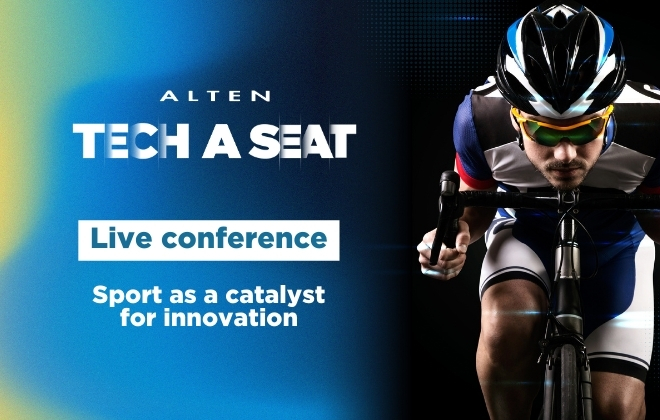Winning data

As part of the ALTEN group, the data and AI experts at Lincoln, specialize in adding value to customer data. Lincoln helps its clients to stay one step ahead by turning data into valuable information that is used to improve performance. Data are crucial for knowing what people want and how they like to receive it. Likewise, data help athletes to do their best and coaches to devise better game strategies, and they heighten fan engagement, both on and off the field.
Maxime Boursin and Dorothée Delaunay provide insights into this complex and fascinating realm.
Maxime and Dorothée, in a few words, what is Lincoln about?
Dorothée Delaunay: Leveraging our expertise in data and artificial intelligence, Lincoln supports clients across various industries, helping them to develop operational and innovative solutions to their business challenges. Currently, there’s a lot of demand for integrating AI, especially generative AI, into business processes. We provide clients with comprehensive AI programs, from ideation and experimentation to industrializing solutions.
Maxime Boursin: Lincoln and its advisory team help companies structure their data, analyze it, and build AI solutions to address their strategic transformation and development challenges. We bring our expertise to our clients, whether from a technical or functional perspective, addressing both IT departments and business units. We develop methodologies and tools to enhance client data and prepare it for better utilization, covering areas such as supply chain, marketing, sales, customer experience, and risk management.
How does this relate to data in sports?
MB: In sports, our goal is to transform data into insights by focusing on the performance of athletes and their equipment, game strategy analysis, and sports marketing issues such as pricing, ticketing and campaigns. The sports industry has seen a rapid increase in data use. Our work uses real-time or “hot” data to make decisions during matches and historical – “cold” – data to improve equipment or strategies. For example, to boost rugby or soccer players’ performance, teams are using data from sensors in jerseys to analyze movement and effort, and videos for strategy improvements.
DD: We use deep learning – processing videos using neural networks – to analyze and categorize data. In sports, these insights help enhance performance. As Maxime noted, this includes tracking soccer players to collect data on their positions and movements. These data aid in creating tactical visuals, improving pass and shot effectiveness, and decision-making to boost team performance. In tennis, we can follow a player on the court, analyzing their emotions at key moments in the match or against a particular opponent. This helps coaches to manage pressure and strategize. Computer vision is also a valuable tool in medicine, for disease detection, and in industry for quality control and predictive maintenance. Sensors can monitor equipment or aircraft parts to evaluate reliability and predict failure.
MB: We collect existing data and create new ones, according to specific needs. By making data readily understandable, we contribute to informed decision making for objectives that range from preventing injuries and optimizing training periods to improving aerodynamics and equipment performance – and much more. The data are also used to communicate with fans at the right time, with the right message.
Have you uncovered new aspects of improved performance?
MB: Dorothée mentioned emotion analysis. This is something that has been developing recently in sports, especially during the crucial moments of a competition or match. An athlete needs to be able to anticipate his or her emotions in order to better manage stressful situations. For example, when a runner is overtaken in a race, a negative reaction could lead to slowing down and under-performance. If this reaction can be anticipated it can be managed more positively.
DD: The data and the AI algorithms can also help to put a team together. Questions like which player should we recruit? What position should we put them in? AI can help to assess how individual performers complement each other, identify players with tactical intelligence, and recognize compatible playing styles and players’ ability to collaborate.
You mentioned communication and marketing – how does this play out?
DD: We help our customers to optimize their marketing campaigns by improving targeting and personalizing the offerings. We collect customer data to identify their behavior and preferences, analyze their spending and frequency of consumption, find out the types of products and services they consume and so on.
I imagine that all these subjects bring a number of ethical concerns.
DD: We have commitments on privacy and confidentiality. All the data, whether they are corporate data or data linked to sports, are subject to the EU General Data Protection Regulation (GDPR). All the data we use and exploit as an algorithm is anonymized and we’re committed to destroying the data after a certain period of time.
MB: There’s an important rule in the GDPR, which is that from the moment you buy something, book something or use a phone, everything is subject to consent. Without the user’s consent, we can’t exploit the data.
What are some of the other areas where data are helping to prepare for the Olympics?
MB: There are numerous examples. For the Olympics, a lot of camera data will be used for security and to regulate urban mobility – to analyze population flows, avoid traffic jams and direct people and organizers in such a way that there’s fluidity, so that we don’t end up with bottlenecks that can pose safety problems. A huge amount of data – hotel reservation data, ticket reservation data – is also being used to find out where spectators are going to go and offer the best possible transport service during the Games.
What about data quality, data reliability?
DD: This is a big question for us and for our customers too: making sure the information is reliable so that the decisions it supports are relevant. All the work involving the use of data necessarily begins with it a quality assurance phase. It’s a prerequisite!





















